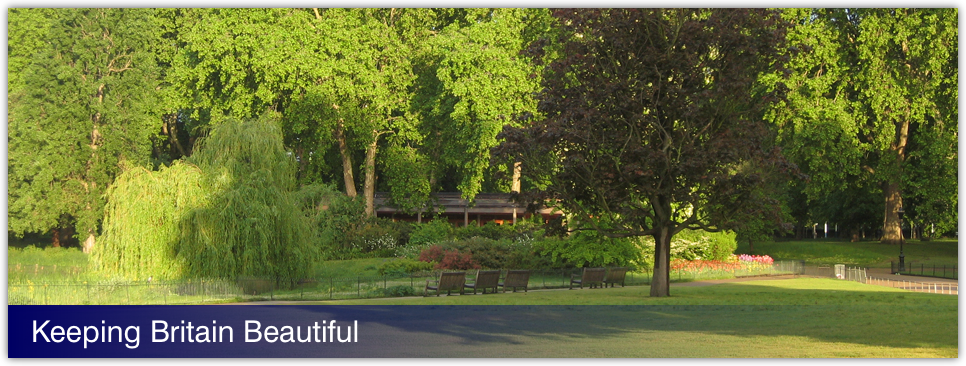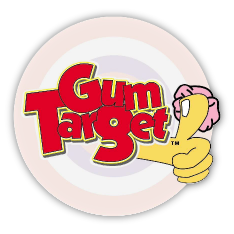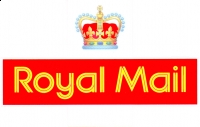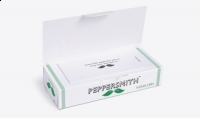|
Latest News
The chewing gum business is losing its pop
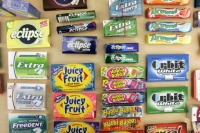
NEW YORK — Gum seems as appealing as that sticky wad on the bottom of a shoe these days.
It's not that Americans still don't ever enjoy a stick of Trident or Orbit, the two most popular brands. They just aren't as crazy about chomping away on the stuff as they once were, with U.S. sales tumbling 11 percent over the past four years.
No one in the industry can pinpoint a single factor that's causing the decline — the theories include an unwillingness to shell out $2 or more for a pack in the bad economy or that advertising veered too far from underlining gum's cavity-fighting benefits. But the biggest reason may be that people simply have more to chew on.
From designer mints to fruit chews, candy companies have invented plenty of other ways to get a sugar fix or battle bad breath and anxiety. The alternatives don't come with gum's unpleasant characteristics either, like the question of whether to spit out or gulp the remains. They're also less likely to annoy parents, co-workers or romantic interests.
“You talk to someone and they're just chomping on gum,” said Matt Smith, a 46-year-old who lives Albany, N.Y. and hates gum so much he refers to it only by its first letter. “If you substitute gum for any other food, like mashed potatoes, would you find that acceptable? It's disgusting.”
The gum chewing habit dates as far back as the ancient Greeks but arrived in the U.S. in its modern form in the 1860s, according to Mars Inc., the No. 1 player in the market with its Wrigley unit.
Over the years, gum makers positioned it as a way to “Kiss a Little Longer” in the famous Big Red jingle, quit smoking, curb cravings or just make the chewer happier. Catchy slogans or characters included the “Doublemint Twins” and Orbit's blonde spokeswoman who ends commercials with “Dirty mouth? Clean it up.”
It popped up in pop culture too. In the 1960s, a genre of music aimed at younger audiences came to be known as “Bubblegum.” In the 1975 movie “One Flew Over the Cuckoo's Nest,” the silent Chief Bromden speaks for the first time saying, “Mmm, Juicy Fruit” after the character played by Jack Nicholson gives him a stick of the gum. And Janet Jackson played a feisty, gum-chewing beautician in the 1993 film “Poetic Justice.”
But gum's image as a tasteless habit also stuck, with some high-profile gum chewing only making it worse.
In 2003, Britney Spears gave an interview to CNN where a white piece of gum could be seen floating around her mouth as she fielded questions on a range of topics, including the war in Iraq. Talk show host Wendy Williams has a “gum wall” backstage, where she sticks wads of it before walking out. In one episode, she told Patti LaBelle that she could put her gum on the wall after the singer spit out a wad into her hand.
Such imagery may be why gum is still a no-no in business meetings or first dates, according to Lizzie Post, the great-great granddaughter of etiquette expert Emily Post and co-author of “Emily Post's Etiquette.”
“My grandmother used to tell me, 'You look like a cow chewing cud',” she said.
The habit so bothered author Malachy McCourt that the extremely long-shot gubernatorial candidate in 2006 told the New York Times he wanted to triple the tax on gum. The former Green Party nominee explained that he didn't like the mess it created on sidewalks and subways.
“The other aspect of it is that it makes people look so stupid,” said McCourt, 82, in a recent interview.
Gum's bad image is one reason that alternatives look more attractive. There's also another perennial complaint: “The flavor runs out too fast,” said Ryan Furbush, a 17-year-old from Sayreville, N.J. who has stopped chewing gum in favor of chewy candies and chocolates.
It may be why Mars said its gum declines have been most significant with people who are 25 and younger. In the meantime, Altoids mints, Welch's Fruit Snacks and countless other options have taken up space in the checkout aisles where most gum is purchased.
Since peaking in 2009, U.S. gum sales have fallen 11 percent to $3.71 billion last year, according to market researcher Euromonitor International. That's even as overall candy sales — including gum, chocolate, mints and licorice — have climbed 10 percent to $31.53 billion.
Over the next five years, Euromonitor projects gum sales will drop another 4 percent to $3.56 billion.
Hershey, which makes Reese's, Kit Kat and Almond Joy, is taking data to retailers to illustrate the slowing demand for gum. The idea is to encourage them to devote less of their candy aisles to it, and perhaps make way for more of its own products. Hershey, which also makes Ice Breakers mints and gum, is planning another blow against gum: This fall, it's slated to roll out a version of Ice Breakers that “chews like a gum, but dissolves like a mint.”
Steven Schiller, global head of Hershey's non-chocolate candies including mints, said it gives gum chewers an alternative that doesn't require “disposal” at the end.
Gum makers are strategizing too. The maker of Trident, whose total gum sales were down as much as 16 percent in developed markets at one point last year, has an online campaign reminding people to run through the mental checklist before leaving the house: “phone, keys, gum.”
“We know when people have gum in their pocket or backpack or desk, they're much more likely to chew it,” said Stephanie Wilkes, who heads the North American candy business for Mondelez, the No. 2 player in gum with Trident, Dentyne and Bubbalicious.
Mars, which makes Big Red, Doublemint, Juicy Fruit and Orbit, is testing illuminated racks in candy aisles to make its gum and candy stand out more. The company said the racks have led to a 10 to 30 percent sales increase in tests.
And after years of slowly vanishing from shelves, Bazooka bubble gum last year relaunched its brand with new marketing and packaging. Distribution has since rebounded.
Still, executives are realistic about gum's turnaround prospects.
“We're not expecting any dramatic recovery in the category anytime soon,” Mondelez CEO Irene Rosenfeld said during an earnings call last month.
Facilities Management Company Laing Launch GumTarget School Trial
Chewing gum litter is an issue across many areas of society. Many children like to chew gum and even though schools ban it some children do still bring it to site and often it is not disposed of responsibly.
Chewing gum litter at school sites can create the impression that the property is not well maintained and this often leads to other forms of antisocial behaviour.
Innovative FM company John Laing, recently acquired by Carillion FM has launched the GumTarget Initiative into three Yorkshire schools that they are responsible for maintaining in a bid to monotor the impact that a combination of awareness and convenient disposal will have
Reports of littered gum and the time taken to remove it has a significant impact on John Laing's staff. Gum litter can be difficult to remove and if the amount of gum dropped can be reduced significant time savings can be made and service improvements achieved.
"GumTargets have worked well in many other schools" offered Meteora's head of Business Development, Ian Kenyon. "The innovatiove designs displayed on the GumTargets appeals to the audience, grabs their attention and encourages responsible disposal" he continued.
Whilst many schools don't want their pupils to feel that gum on site is acceptable, much can be acheived by placing GumTargets at the perimeter of the property and by main entrance points. "this notifies students that they are entering a gum-free zone and that they must dispose of their gum before coming into site" says Kenyon.
“We introduced GumTargets on a trial basis at one of the schools we manage to help us reduce chewing gum litter. We are very pleased with the results. The pupils really like them, they are getting lots of use and we have now extended the scheme into a number of other school sites.” commented Frazer Simpson of Carillion Service Solutions

Coventry City Council Continues to Fight Gum Litter Problems
Back in 2007 Coventry City Council launched the GumTarget Initiative in a bid to reduce the amount of gum littered in the city centre. The person responsible for this innovative approach was Gary Pittaway, cleansing manager with CV One, the Council's joint venture partnership responsible for maintaining the City Centre.
At the time Gary commented "It is fair to say that both the cleansing and grounds team and I have been amazed by the response to the GumTargets shown by the general public. We have placed approximately 70 targets in Coventry City Centre and each unit is being very well used. We are replacing the gum stickers every two or three days at some locations near fast food shops and the total usage by the public has been excellent"
Gary's battle against the gum litter problem continues and whilst the GumTargets are still working well in the city centre Gary has also been involved in the Chewing Gum Action Group advertising campaign to further raise awareness of the problem of littlered gum.
“I suppose there are different views on chewing gum, but my view is that if you just leave gum all over the pavement it looks like you are not caring for your environment.” said Gary
And with this in mind he continues to be commited to raising awareness in order to reduce the amount of gum littered. Recently the GumTargets in the city centre were removed and replaced with new ones, they'd be so well used it was time for some improvement. Gary remains commited to reducing gum litter and committed to the GumTarget Initiative.
The council also ran a competition in conjuention with the local radio station to encourge local people to get involved with the GumTarget designs

Norfolk County Council Relaunches GumTarget Initiative
Norfolk County Council originally became a part of the GumTarget Initiative way back in 2007 when they installed GumTargets into one of their major bus depots. After seven years of successful service the time has come to take down the GumTargets and replace them with new ones.
The results speak for themselves, there is less gum litter to deal with and the public has continued to support the efforts of the bus station staff to maintain a clean and inviting environment.
"we are always happy to swap out GumTargets that are becoming a little tired after many years of successful use" offered Ian Kenyon, responsible for GumTarget business development "and what's even better is that there is no additional cost for our customer" he continued
The GumTarget Initiative has been helping Local Authorities, Education and private industry tackle the problem of littered chewing gum for over ten years
Does chewing gum make you fat? (and 5 other theories)
This tiny piece of confectionery is worth huge amounts of money - despite the abundance of fears about its side effects. We check a few of them so you can chew over the facts
Does Chewing Gum Help You Concentrate?
If you want to be a rocket scientist, you might want to start chewing that stick of gum. At least, that’s the hypothesis of a growing body of research that suggests chewing bubble gum is correlated to the ability to concentrate on various mental tasks. And as every student knows (or at least should know) it’s not the amount of time you spend studying that matters – it’s the the amount of time you are actually learning. In short, the more you concentrate, the more you learn, the more you know. But what does the actual science say about this
Does Chewing Gum Make You More Fun?
Beldent Gum (the Argentine version of Trident) wanted to show that chewing gum doesn't send a bad impression -- contrary to what your parents and career-advice columns have told you. In fact, it can make you look like someone who has a lot of friends, great sex and is an all-round good time.
So the brand conducted an experiment via an art installation using identical twins at the Museum of Contemporary Art, Buenos Aires. Visitors were shown several pairs of twins, one chewing gum and the other not, and asked a series of questions. They included: which one had more party invites? A better sex life? Was more likely to give you a raise, or a parking ticket? Of the 481 people who participated in the experiment, 73% favored those twins who chewed gum.
The campaign was dreamed up by Argentine agency Del Campo Saatchi & Saatchi, whose innovative projects for regional clients such as Andes Beer, BGH and Norte have already won multiple awards.
Winchester Business Improvement District Tackles Gum Litter Head On
WINCHESTER Business Improvement District has launched a new plan to clean up the city.
The BID has teamed up with the city council to provide enhanced street care including routine repairs, redecorating street furniture and chewing gum removal.
The new StreetCare team, funded by the BID, will draw up and complete a schedule of works each week.
Cllr Jan Warwick, portfolio holder for neighbourhoods and environment, said: “We are delighted to be working with the Winchester BID on this important programme of works throughout the city. A large proportion of this work is basic routine maintenance that can make such a difference to the overall appearance of the streets and the overall shopping experience.”
BID manager Catherine Turness added: “Chewing gum, trade waste and general maintenance is an on-going concern for many businesses and we want to address these issues efficiently.”
Council Spends Whopping £18,000 on Gum Removal
Southampton borough council is spending £18,000 to remove chewing gum from Top of The Town as part of its work to improve the area.
Work has begun in London Road and Winchester Street, and will move to Castons Walk, Joices Yard, Potters Street, Church Street and Wote Street.
Chewing gum removal experts and special equipment is costing £18,000.
The work is due to be complete by November 6.
Following the clean up, the council’s community safety patrol officers will use their enforcement powers to ensure the Top of The Town area stays as clean as possible.
Councillor Ranil Jayawardena, the council’s deputy leader, said: “We want to bring back real pride in our historic town centre. Giving the pavements in the streets leading into the Market Place a really good clean is one of the ways we are investing in a better environment for the area.
“We hope people will dispose of their gum in the bins in the future to keep the pavements cleaner – and our patrolling officers will work to ensure that this happens.”
Milton Keynes Support Chewing Gum Action Group
Written byJAMES AVERILL
A new campaign has been launched today to prevent increasing levels of chewing gum litter in Milton Keynes.
Milton Keynes City Centre Management, in partnership with Milton Keynes Council, is aiming to reducing littered gum in the local area.
Encouraging residents to ‘Bin it your way’, they have partnered with the Chewing Gum Action Group (CGAG), an organisation chaired by Defra and funded by the chewing gum industry.
Results from previous years demonstrate the significant impact of the campaign on gum litter levels. Following 2012’s activity, gum litter levels fell by an average of 54 per cent in participating areas, with some authorities reporting even better results.
Cardiff Council reported a 93 per cent decrease whilst Nottingham City Council and Coventry City Council announced drops of 88 per cent and 85 per cent respectively.
The new advertising campaign features professionally choreographed dance moves, encouraging gum chewers to dispose responsibly of gum litter or face a fine of up to £80.
The brightly coloured adverts will appear in a range of locations across participating local authorities and districts, including roadside banners, bus stops, lamp-posts and telephone kiosks.
Melanie Beck, city centre manager at Milton Keynes City Centre Management, said: “Chewing gum litter is a real nuisance that is costly and difficult to remove. We want the residents of Milton Keynes to be proud of where they live which is why we have partnered with the Chewing Gum Action Group to raise awareness and proactively tackle this problem.
“We hope that this campaign will encourage gum chewers to think before they dispose of their gum and understand that they can play a part in making Milton Keynes a clean and inviting place to live.”
CGAG campaign co-ordinator Kristian Bentham said: “Over the past eight years we have been extremely encouraged by the results of the CGAG campaign and we are looking forward to working with this year’s participating authorities to help create cleaner, more attractive places to live and work.
“We are committed to building on the success of previous years and hope to see a significant reduction of chewing gum litter in Milton Keynes.”
Read more: http://www.mkweb.co.uk/News/Community/Campaign-launched-to-tackle-gum-litter-in-Milton-Keynes-20131007080000.htm#ixzz2t7h2Nv5Q
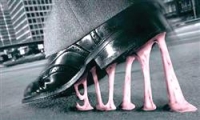
Yorkshire Council Works Hard to Raise Awareness of Gum Litter Issues
OFFICIALS are getting stuck into efforts to tackle the menace of chewing gum on the streets of a Yorkshire city.
An industry-sponsored initiative is launching an advertising blitz aimed at reducing the amount of gum dropped at 10 hotspots in Hull, including outside the city’s transport interchange, pubs and entertainment venues.
Roadside banners, bus stops, lamp-posts and telephone kiosks will display the adverts, which encourage people to bin the gum or face an £80 fine, while the council is stepping up enforcement by sending out littering patrols on weekends this month.
One benefit of the scheme that the tab is picked up by chewing gum manufacturers who fund the Chewing Gum Action Group, rather than the cash-strapped council.
The campaign, now in its eighth year, claims to have seen litter levels drop on average by more than half in areas where it was run last year.
Cardiff Council reported a 93 per cent decrease while Nottingham City Council and Coventry City Council said they had achieved drops of 88 per cent and 85 per cent respectively.
Assistant head of service Doug Sharp said the littering wasn’t getting worse but “it’s just a perpetual battle.”
Normally there are just two people manning a high-pressure steam cleaning machine used for tackling the gum as well as graffiti in the city. It works by heating the gum up to 180 degrees, to make it more malleable.
Mr Sharp said: “It’s 100 per cent effective at removing gum but we simply do not have the resources to be out cleaning gum from every street corner. There is no way we could have the resource on a reactive basis to keep the city spotless, which is why we wanted to work with Keep Britain Tidy (which is involved in the campaign) on measures to stop it happening in the first place.”
Gum bonds strongly to asphalt and rubber shoe soles because they are all made from polymeric hydrocarbons.
In 2000, a study on Oxford Street, one of London’s busiest shopping streets, showed that a quarter of a million blobs of chewing gum were stuck on its pavements.
Mr Sharp said he was open-minded about the scheme’s impact: “We have had litter for as long as there has been packaging which tells us that it is an extremely difficult thing to do to change people’s behaviour.
“We are doing this because we want to find different, more efficient ways of stopping the problem. I am sure it won’t solve the problem completely, but if it adds something it is better than nothing.”
The scheme also targets the areas outside two popular city pubs, the Admiral of the Humber pub on Carr Lane and Greenbricks on Humber Dock Street, and south of the Cenotaph on Paragon Square.
Mr Sharp added: “We have picked a range of busier areas and known hotspots. With the no smoking regulations people are outside more and it does give us different issues to deal with.
“As part of the scheme we have committed to put in additional enforcement in October to help raise its profile.”
Councillor Martin Mancey, Portfolio Holder for Energy City, said: “Chewing gum litter is a real nuisance that is costly and difficult to remove. “We want the residents of Hull to be proud of where they live which is why we have partnered with the Chewing Gum Action Group to raise awareness and proactively tackle this problem.
“We hope that this campaign will encourage gum chewers to think before they dispose of their gum and understand that they can play a part in making Hull a clean and inviting place to live.”
CGAG campaign co-ordinator Kristian Bentham said: “Over the past eight years we have been extremely encouraged by the results of the CGAG campaign and we are looking forward to working with this year’s participating authorities to help create cleaner, more attractive places to live and work.”
Could Gum Ban Work in Scotland?

A RADICAL solution has been suggested to end the sticky scourge of chewing gum on town centre pavements – outlawing it altogether.
Bringing in a gum ban is just one of the suggestions put forward by the council to the Scottish Government.
The authority has answered a series of questions posed by the Government on plans to crack down on litter and fly-tipping.In its reponse, the council labels discarded gum “a blight on the environment”.
It adds: “It is costly to remove and stretches council budgets. A lead should be taken from cities such as Singapore where chewing gum has been banned completely.”
And in terms of fly-tipping and litter, the council has backed an increase in fines to act as a greater deterrent.
It has told the Scottish Government: “The level should be increased for fly-tipping to £200, but reduced for prompt payment.
“The current level has remained unchanged for many years and does not reflect the time and effort taken to investigate.”
The council believes it could also be beneficial to raise fixed penalty notices for litter and dog fouling to £100. A meeting of the neighbourhood services committee discussed the issue on Thursday.
Readers had their say on Facebook, with many casting doubt on whether a chewing gum ban would be beneficial or achievable.
Paul Monaghan said: “Nothing wrong with some gum – it’s not hard to dispose of it properly.
Dog poo on the other hand is disgusting and anyone not picking up after the dog should get fined, with repeat offenders losing the dog and the right to have one.”
Elaine McNamara said: “Anyone that does not pick up their dog mess should be fined more than £100.”
The local authority purchased two chewing gum removal machines in 2009.
Julie Ralston added: “I have seen the chewing gum removal machine. It was out on two consecutive days. It took two days to clean about two square metres!”
Depute leader of the council and convener of neighbourhood services, Ashay Ghai, said: “Anything we can do locally and nationally to make people think twice about dropping litter, spitting out chewing gum, fly-tipping and letting their dogs foul our pavements and open spaces is a step in the right direction.
“Ask anyone about the issues that matter to them and these things come up time and time again so we need to continue to tackle them.
“Steeper fines of £100 for littering and dog fouling is one suggestion the council has made. Not only is it hoped that it will act as a deterrent, but the increase better reflects the expense involved in the enforcement rocess.
“There is a zero tolerance approach to discarded chewing gum across the whole of Singapore where offenders are fined. Chewing gum removal is a very expensive process and the council is suggesting a national solution to deal with it.
“We are seeing more and more chewing gum discarded in areas where we used to find cigarette butts. With the smoking ban came an increase in people chewing gum.
“Our two chewing gum removal machines proved to be neither reliable nor cost-effective so we now use alternative methods such a power washing.”
Council Fine Litterer for Dropping Gum

A CHEWING-GUM litter-bug will have to fork out £75 after he was hit with a fixed-penalty notice by sharp-eyed enforcement officers.
The man, who has not been named, was spotted by Carmarthenshire county council environmental enforcement officers dropping chewing gum at Cross Hands Business Park and was immediately hit with a penalty notice for littering.
It is only the second fine issued in the county in relation to chewing gum litter.
Failure to pay could lead to prosecution in the magistrates court and a maximum fine of up to £2,500.
Executive Board Member for Environmental and Public Protection Councillor Jim Jones said: “This is the second fine that we have issued specifically for chewing gum litter.
“Our enforcement officers carry out regular patrols across the county but it can be very difficult to catch people in the act.
“Obviously we don’t want to fine people; we would prefer they don’t drop litter in the first place, but if they fail to take notice then we have no choice.”
The council has taken part in a national chewing gum litter campaign, funded by the Chewing Gum Action Group, for the past three years. The aim is to encourage people to put their gum in the bin and remind them that dropping litter is an offence.
Not only is chewing gum litter an eyesore but it can stick to people’s clothes and shoes and it is difficult and costly to clean up - it costs the council approximately £30,000 a year to remove chewing gum from our streets.
Cllr Jones added: “I hope people will take notice of this fine and put their litter in the bin, whether it’s chewing gum or another type of litter. The council is determined to create a cleaner and safer environment for both residents and visitors to Carmarthenshire.”
Littered Gum Continues to be a Problem in Peterborough
Painstaking work has begun to clear the vast amount of used chewing gum that has been dropped on to the paving stones in Peterborough city centre.
A team of cleansing officers are expected to spend the next six days in Cathedral Square and St John’s Square removing the thousands of pieces of gum stuck to the pavement.
A spokeswoman for Enterprise Peterborough, which is carrying out the work on behalf of Peterborough City Council, said: “Each person can remove 150 pieces of chewing gum each hour.
“They are each using a low pressure steam lance which contains a citric-type substance which dissolves the gum and any debris can then be swept away.”
The growing amount of chewing gum left on the streets has been a case of concern almost since the day the £12 million revamp of the city centre was completed.
Earlier this year, council bosses acknowledged that various approaches to cleaning the city centre were failing to rid the surface of discarded chewing gum.
This was despite Enterprise Peterborough having carried out a number of so-called “deep cleans” of Cathedral Square and St John’s Square – in addition to its regular sweeps of the area – ahead of the busier summer and Christmas periods.
Paul Phillipson, executive director of operations for the council, said: “Chewing gum is an issue for many towns and cities and continues to be a problem in Peterborough. There is no easy solution to deal with chewing gum and it is extremely time consuming and costly to remove it from surfaces.”
Romanian Robber Met With Sticky End!

ROMANIAN man tried to steal a trolley-load of chewing gum from a supermarket, a court heard.
Robert Mihai was seen wheeling £1,181.67 worth of gum in a Sainsbury's store in Weston-super-Mare.
Bristol Crown Court heard he and three accomplices tried to flee. But Mihai's bid for freedom was foiled when he was found by security guards hiding in a nearby garden.
The 48-year-old non-English speaker, of Hounslow, West London, pleaded guilty to theft on June 11.
Yesterday, recorder Mr Timothy Mousley QC adjourned the case to August 14, pending a report from the probation service.
He said: "I have in mind a community penalty and that would involve unpaid work and/or a curfew.
"I do not think I can make that order today, without being satisfied that it is workable."
Mihai was provided with a Romanian interpreter to allow him to follow proceedings.
Greg Gordon, prosecuting, said a security guard noticed Mihai push his trolley by, full of chewing gum.
The court heard intrigued security staff followed Mihai, as well as another man, before the other man fled.
Mr Gordon said: "Mr Mihai was seen in the car park with two other men, loading the chewing gum into carrier bags. When the defendant saw the security guard approaching them he ran. He was chased to some rear gardens, where he was found hiding behind a bin. He was taken back to the store but none of the other three males were detained."
All chewing gum removed from the store was recovered, the court heard.
Mihai gave police a short, prepared statement in which he admitted the offence but denied that any of his friends were involved. He then gave a "no comment" interview.
Mr Gordon said: "It seems plain the gum would have been sold on."
Philip Warren, defending, said: "He pleaded guilty and admitted the offence to police. He has no previous convictions and the goods were recovered in full. He did not get near to getting away with it. It was blatant and unsophisticated. He was not operating alone. He was a foot soldier rather than a staff officer."
Read more: http://legacy.thisisbristol.co.uk/Romanian-48-tried-steal-trolley-load-chewing-gum/story-19565296-detail/story.html#ixzz2t7Wi9HA1
Irish Gum Awareness Campaign Hopes to Change Behaviour
THE GUM LITTER Taskforce (GLT) are stepping up their efforts with the ‘Bin it Your Way’ campaign which was launched last year.
This is the second year of the three-year campaign which uses “fun and energetic” ways to promote the responsible disposal of chewing gum.
According to Paul Kelly, chairman of the GLT, this year the campaign will include TV advertising as well as on-pack messaging. The campaign will also sponsor three awards in Ireland’s Tidy Towns competition.
A survey conducted at the end of the first year of the campaign showed a 28 per cent reduction in gum litter nationally.
The survey also showed a significant improvement in attitudes towards gum litter, with 92 per cent of those surveyed saying they view irresponsibly disposed of gum as litter.
Mayor of South Dublin County, Cllr Dermot Looney, said the campaign has helped deliver the anti-littering message in “a lively and creative way
Sticky problems: Economic downturn to stunt global chewing gum growth
Global chewing gum growth is being stunted by the economic downturn and declining numbers of children and teenagers, says Leatherhead.
Gum Tax Bad Idea Say Wrigleys
A Saga survey supports a tax on chewing gum to pay for clean-up costs. Is this a reasonable levy or just a reflection of grumpiness among older people?
The over-50s are calling for a tax on chewing and bubble gum to help fund a clean-up campaign and encourage the use of degradable natural gum, according to research by Saga.
Of the 14,000 people that responded to the Saga Populus Panel, 82% supported the idea of a levy on synthetic gum: 21% thought a 1p tax per piece of gum was appropriate, while 20% thought 10p per piece was reasonable.
Britons are estimated to chew about 1bn pieces of gum a year, so a 10p levy would raise £100m towards the £150m clean-up costs paid by local councils. More importantly, Saga says, a tax that pushes up the cost of a pack of Wrigleys Extra gum (10 pieces) from its rrp of 35p to £1.35 could persuade consumers to switch to biodegradable gum – the only kind available until the 1950s.
Wrigley claims that taxing gum would make the litter problem even worse. "Research shows that consumers claim they would be more likely to drop gum as they feel they have already paid for the clean up," it said.
It also points out that natural gum degrades no faster than synthetic, and is actually a lot more sticky and could lead to sustainability problems in terms of forestry.
Unsurprisingly, its approach to the issue doesn't involve making the product more expensive: "Gum litter is caused by the irresponsible behaviour of a small minority of chewers who need to be educated to dispose of their litter properly.
"Consequently, we believe that a fully integrated approach encompassing education and enforcement is required to tackle this issue in an effective and sustainable manner."
But Emma Soames, editor at large for Saga Magazine, maintains that a tax is the right way forward: "Look along many of our nation's high streets and you see polka dot pavements caused by gum. It costs local taxpayers millions each year to clean up the worst of the mess, and probably costs businesses and individuals much more.
"If each pack of synthetic gum was increased to cost 50p more it would encourage miscreant masticators to think twice about spitting it on the floor and encourage them to seek out a natural biodegradable alternative. It might also make them more careful about how they dispose of it."
Saga claims that despite the best efforts of chewing gum providers and campaign groups, too many people still adopt the "spit and go" approach to disposal, and that it wasn't surprising that Londoners were most in favour of the chewing gum tax.
Really? I walk around London all the time and can't remember the last time my feet were stuck to the pavement by a glob of grey, or I inadvertantly wedged my fingers into someone else's soggy offering under a seat or table. And a straw poll of people at the Guardian has produced similar results.
Our office is near King's Cross – surely stations are prime areas for gum chewing? So either councils are being super efficient at removing gum (hard to believe when they don't notice potholes the size of an asteroid crater), or people are already disposing of their gum more considerately – either by putting it in a bin or swallowing it.
Which begs a question for you to chew over: does this survey simply reflect grumpy 50-somethings resenting the mastications of a younger generation?

Bradford College teaches responsible disposal
Following last year’s GumTarget launch Bradford College have monitored their use and the reduction of chewing gum litter. So pleased with the results, the GumTarget Initiative has been extending with the installation of additional gum disposal boards
Royal Mail delivers GumTarget Initiative
Chewing gum litter can be a problem in many various locations and the Royal Mail sorting offices are no exception. In order to help reduce the gum litter problem, the Royal Mail is delivering the innovative and effective GumTarget Initiative in association with Meteora Limited
Rochdale MBC tackles gum litter with GumTarget launch
Providing a clean and tidy town centre is high on the agenda at Rochdale Metropolitan Borough Council. Gum litter is an ongoing problem and much effort has been invested in managing this issue. Now the council is working closely with Meteora Limited to encourage responsible disposal through the education and awareness that comes from the GumTarget Initiative
Alton Towers Launches GumTarget Trial
Merlin Entertainments, owner of the UK’s most thrilling theme park, Alton Towers, is launching a GumTarget trial to help combat the problem of litter chewing gum at it’ s Staffordshire attraction.
Gum litter is a major problem at many UK venues and Alton Towers is no different. Whilst a huge amount of effort is made to ensure the park is clean for all visitors, much time and effort is invested in gum removal and it is hoped that the use of GumTargets can encourage guests to dispose of their gum more responsibly and therefore reduce removal costs.
GumTargets a Great Success for Carillion
Lifelong learning is a reality. Closer links between school, work and community are opening up opportunities for all. Carillion is providing flexible, creative schools, intelligent systems for independent learning, and facilities for a wide range of sports and extended school activities. It’s important that these spaces are properly managed and well maintained. Gum litter can be a major issue in any environment where young people congregate and schools have been trying to deal with this issue for many years.
Carillion Education has embraced the GumTarget Initiative and launched trials at two of its Pfi sites. The early results are very encouraging, the children and staff like them and huge amounts of used gum is being collected and disposed of responsibly before it can degrade these new learning environments.
Guildford Borough Council Plans GumTarget Campaign
Clean and well maintained public space is high on the agenda for Guildford Borough Council. With this in mind they have recently undertaken a major gum removal programme in a number of areas throughout the borough. In order to reduce the amount of gum that is is littered in these recently cleaned areas an awareness campaign in being planned with Meteora Limited to encourage responsible gum disposal through the use of the GumTarget Initiative. The campaign will launch at the end of March and is expected to greatly reduce the amount of littered chewing gum for the council.
Kingsford Community School Targets Gum Litter
SGP Property & Facilities Management provides an end-to-end range of support services for the occupier and owner of commercial or public sector property. SGP prides itself on bringing new ideas and different ways of working to its commercial partners. SGP recognises the success Meteora has achieved with the GumTarget Initiative at numerous public sector sites. As the cleaning and maintenance contractor for Kingsford Community School, a specialist language college in London, SGP recognises the importance of a clean learning environment and has introduced the GumTarget Initiative into the school to combat littered gum.
Does Chewing Gum Cause Wrinkles
It freshens our breath and helps us quit smoking, but some cosmetic surgeons believe chewing gum does one more thing: It gives us wrinkles.
“Many of my patients who are gum chewers have a certain pattern of wrinkles around their mouth,” says Dr. Joel Schlessinger, a board certified dermatologist and cosmetic surgeon from Omaha, Neb. “And I think the gum is responsible to some degree for it.”
While no studies have been done showing a link between chewing gum and wrinkles, the topic does come up with some regularity on beauty blogs.
Experts attribute the gum-wrinkle connection to two things. First, there’s the repetitive motion of chewing, which causes lines and folds around the mouth due to muscle overuse, says Dr. Hema Sundaram, a Washington, D.C.-area cosmetic surgeon and laser expert.
“I believe chewing gum promotes muscle over-activity and potentially breaks down support tissue within the skin, contributing to volume loss and perhaps loss of skin elasticity,” she says.
What's more, chewing gum can dislodge dermal fillers that people have injected into their faces to plump up their wrinkles.
“It makes your Restylane and other fillers last less long,” says Sundaram.
Schlessinger says he’s observed this with his patients, as well.
“The act of chewing gum can dislodge the fillers earlier,” he says. “It actually pushes them out of the area. They dissipate a lot quicker in gum chewers in my opinion.”
But before you spit out that gum, consider this. An October 2009 study in Germany discovered that “chewing gum had a significant and positive effect on concentration performance.” (The test was performed on two classes of relatively wrinkle-free third graders.) Additional research shows chewing gum decreases stress (in a study sponsored by Wrigley), increases alertness, and helps less the severity of nicotine withdrawal symptoms.
Dr. Jane Soxman, a board certified pediatric dentist from Allison Park, Pa., says there are many dental benefits to chewing gum, as well (she recommends gum with the sugar substitute xylitol).
“It stimulates salivary flow, assisting with the removal of food residues from the teeth,” she says. “It neutralizes the acid in your mouth. And if you have an early, early cavity, it helps to remineralize the area and reduce the advancement of tooth decay.”
The gum-wrinkle connection is a new one on her, though.
“I know cigarette smoking creates wrinkles above the upper lip with the pursing of the lips, but I’ve never heard of gum causing wrinkles,” she says.
Repetition is the culprit, says Schlessinger.
“We’re not talking about the occasional gum chewer,” he says. “We’re talking about the person who has a habit of chewing gum and is rarely if ever seen without a piece of gum in their mouth.”
Anna Viele, a 36-year-old blogger (and former smoker) from Los Angeles, says that’s her.
“I’ve chewed gum my whole life,” she says. “I don’t blow bubbles and I’m not necessarily smacking it all the time, but I always have some in there. I like it because it makes my mouth feel cleaner and I obviously have some kind of oral fixation and the gum helps with that.”
This latest wrinke isn't enough to make her quit, she says
“I guess it makes sense but it’s kind of like saying eating or smiling is going to give you wrinkles,” she says. “It’s not going to keep me from chewing gum. Unless they say you’re going to get wrinkles and cancer from chewing gum. Then I’d be like ‘OK, maybe I should quit.’”
Biodegradable Chewing Gum Launched

Chicza chewing gums, who claim to be the first ones to manufacture biodegradable chewing gum ever sold, went on sale in Waitrose stores in Britain. It is organic and biodegradable chewing gum pitted against highly-adhesive chewing gums which get stuck on roads and streets making life tougher for the cleansing staffs and authorities.
Chicza Rainforest Gum is manufactured in Mexico by Consorcio Chiclero. The raw material of the biodegradable gum is extracted from the sap of the chicozapote tree found in Mexican rain forest.
A chewing gum is made up of gum base of chicle, a natural latex product, or synthetic rubber. Most of the commercial gums constitute of rubber instead of chicle due to their taste and cost effectiveness. The other ingredients in a chewing gum include added flavors and sugar content. These added contents gets absorbed in our body on constant chewing of the gum.
The launch of biodegradable chewing gum is being keenly watched by environmentalists abroad especially in Britain where 93% of the paving stones are spattered by adhesive chewing gum. Not to mention the waste of hundreds of million dollars of money that go into eradication procedures involved in removing these sticky non-biodegradable mess.
The chicle has more recently been replaced by non-biodegradable petrochemical polymers which are more effective for commercial use and its sustenance viability. The stickiness of conventional chewing gums is due to use of elastomer solvents and other wax-like ingredients in the manufacturing processes.
Singapore Retains Gum Ban
March 4 (Bloomberg) -- Singapore plans to keep its general ban on chewing gum after revising the law in 2004 to allow those with medicinal or dental benefits to be sold.
Littering is still a problem in Singapore and the government is standing by its decision amid international criticism of its chewing gum policy, Maliki Osman, parliamentary secretary for the Ministry of National Development, said in Parliament today.
“We remain concerned that lifting the ban on the sale of chewing gum could result in chewing gum litter resurfacing as a problem and undermine our ongoing efforts to curb littering,” Maliki said. “The government’s position is the ban should remain.”
Singapore banned chewing gum in 1992 to prevent discarded wads from sticking to buildings and pavement or interfering with transport after those stuck on subway train doors disrupted rail services. The government partially lifted the ban in 2004 as a condition of a U.S.-Singapore free trade agreement, allowing Pfizer Inc. and Wm. Wrigley Jr. Co. to sell nicotine and tooth- whitening gum with a doctor’s prescription.
New Peppersmith Gum Launches.
Perhaps it's because of its association with movies about rebellious teenagers and ditzy blondes that we're not normally fans of chewing gum. We're willing to make an exception, however, for the newly launched Peppersmith.
Sweetened with wood sugar from beech trees and peppermint grown in Hampshire (there are also no artificial flavours, colours, preservatives or aspartame), it's touted as the first British all-natural chewing gum that's also approved by the British Dental Health Foundation.
But what seals the deal for us is Peppersmith's clever packaging. Each box slides out of its case to reveal a moustachioed icon like Salvador Dali and Charlie Chaplin – the moustache being a sly riff on the company's stylised mint leaf logo.
And lest it be accused to contributing to unsightly gum street litter, Peppersmith has equipped each case with small slips of Post-It-like paper to wrap up used gum.
Initial Cleaning Services Install GumTarget
From September 2009 Initial Cleaning Services will launch the GumTarget Initiative at the Aviva Building, Norwich to combat littered chewing gum. Chewing gum is a difficult and expensive form of litter to remove. It adheres firmly to any surface and does not biodegrade. Once an area has been cleared of chewing gum it is not long before the problem returns. Many people do not recognise chewing gum as litter, and the GumTarget Initiative aims to raise awareness of this problem.
The GumTarget Initiative reduces chewing gum litter by encouraging chewers to dispose of their gum responsibly. The GumTarget is a specialist disposal device that fixes to posts, walls and railings. The front of the GumTarget is covered with a printed, removable GumSheet on which the chewer deposits used gum. These GumSheets carry a campaign of messages that change regularly to maintain interest and motivate the user to dispose responsibly. Unlike a bin that offers no real incentive, the GumTarget provides topical, fun and involving ways to dispose of your used gum.
Ian Kenyon, Meteora Limited the company behind the GumTargets, commented; "we are extremely pleased to be working with Initial and Aviva, as we are all committed to providing a cleaner environment to live and work in. The key to preventing chewing gum litter is raising awareness of the problem."
Mike Davis, Aviva's Waste & Environmental Manager said; "Initial Cleaning Services in partnership with Aviva's Waste policies have recently launched GumTargets as a way of combating littered chewing gum in their Call Centre Environments. The trial is progressing well, and we would be happy to roll this out to other locations in due course"
Council set to address a sticky problem
Council leaders say a change of culture is needed to solve a sticky problem that costs taxpayers thousands of pounds.
Officials at East Hampshire District Council say they will have to keep clearing up chewing gum from the streets until people change their attitude.
It is an offence to drop chewing gum on the street and carries an £80 on-the-spot fine. But every year people are flouting the law.
Mark Bailey, Streetcare manager, said: 'Cleaning gum district-wide is a slow and costly process so if we can stop people dropping gum in the first place that would be the ideal solution.
"We were out on Friday trying to raise the issue of litter generally but also to emphasise that litter also means gum, which is something people don't always realise."
"We have to get the message across to people that it is not acceptable to throw your chewing gum on the street"
Rochdale Launches New Gum Machine
If gum stuck on pavements is a real sticking point, worry no more.
As part Rochdale Council's war on chewing gum litter, residents and businesses can now request the council's chewing gum removal machine free of charge.
The machine allows the council's street cleaning teams to remove gum from pavements much more efficiently by using environmentally friendly chemicals. Previously, power hoses were used to eradicate gum from footpaths, which often meant having to close public rights of way due to spray.
Last month the council launched a campaign, funded by the Keep Britain Tidy Group's Chewing Gum Action Group, to remind chewers that dropping gum is littering, and to put it in the bin after chewing.
Councillor Irene Davidson, cabinet member for Environment and Sustainability on Rochdale Council, said: "We introduced the chewing gum machine a couple of years ago following consultation with the public to help stay on top of chewing gum on the borough's highest footfall areas. We've introduced these machines following consultation with the public to ensure our street operatives can stay on top of cigarette ends and chewing gum on the borough's busiest footpaths.
"We're determined to make the borough a cleaner and more attractive place for everyone, and that goes for busy urban areas too".
Chewing Gum Litter Down 87%

A campaign warning chewers of gum they risk a litter fine if they don't put their used gum in the bin has seen a huge drop in gum litter in the Rochdale borough. Since the campaign's launch at the start of this October, a Keep Britain Tidy survey has revealed gum litter in the borough has gone down by 87% overall.
As part of a national study being carried out by Keep Britain Tidy's Chewing Gum Action Group, Rochdale Borough Council selected 10 high-footfall areas across the borough to carry out a survey to measure reductions in gum litter at the end of the campaign at the beginning of November.
Councillor Greg Couzens, cabinet member for finance, enthused: “What a brilliant result! It’s great timing in the run up to Christmas as we welcome people into our town centres to do their Christmas shopping. Cleanliness of shopping centres is such an important factor as people judge an area based on its appearance and cleanliness. Seeing lots of chewing gum on the floor runs places down, so I’m encouraged by these fantastic results.”
Throughout the campaign, council street cleaning teams wore high visibility jackets with the message ‘don’t drop gum, it’s litter’, whilst high profile gum litter adverting across the borough’s town centres, buses and telephone boxes told chewers that irresponsibly disposed of gum is litter and they could be landed with a litter fine if caught dropping it. This follows an earlier Chewing Gum Action Group study which showed many gum chewers simply don’t associate dropping gum as litter.
Rebecca Joinson, spokesperson for the Chewing Gum Action Group, explained: “Incorrect disposal of chewing gum is a major concern for many councils. It’s an important and emotive issue for residents and costly to remove.
“The results in the Rochdale borough are outstanding and demonstrate that people who chew gum are thinking twice before dropping their gum on the floor. The message that incorrectly disposed of gum is in fact litter and that you can receive a fine for dropping gum has been clearly heard.”
A piece of gum costs about 3p to make – but costs around 10p to clean up each blob off the floor. The problem is so great that councils spend around £150 million a year on cleaning up the UK’s streets.
Councillor Irene Davidson, cabinet member for environment and sustainability at Rochdale Borough Council, said: “We’re absolutely delighted to have achieved such an overwhelming reduction in gum litter.
“Our mission is to make the borough a cleaner and more attractive place to live, work and visit, but we need everyone to support us. By the end of the year we expect to have spent over £40,000 clearing up gum off pavements, but people can help reduce this bill by putting gum in the bin and allow us to plough money into other council services.”
Rochdale Borough Council was one of fifteen local authorities across the UK taking part in the chewing gum campaign - designed to change the behaviours and attitudes towards chewing gum disposal.
East Dunbartonshire Gum Removal Spotlighted
SPECIAL machines to tear up chewing gum from pavements have not been used in Kirkintilloch town centre, it has been claimed. The council splashed out almost £5,000 for two machines in a bid to tackle the sticky problem in towns and communities throughout East Dunbartonshire. But questions have been asked as to why the machines have never been used in Kirkintilloch town centre, since being bought in February.
Lex Gaston, who heads up the Business for Kirkintilloch initiative, said: "The machines have been sitting there doing nothing for months.
"The council said people were being trained to use them, but that was ages ago. I've been on to them about it a number of times.
"The machines are very easy to use. Removing the chewing gum from the pavements would give the town such a lift before Christmas.
"I really don't see how it has taken eight months. They say they are organising teams to do the job, but there was a photocall with the new teams earlier this year and still nothing's been done.
"Kirkintilloch was supposed to pioneer this scheme."
Kirkintilloch East and Twechar Independent Councillor Jack Young is also concerned at not seeing the machines in action.
A spokesperson for East Dunbartonshire Council said: "The council purchased two chewing gum removal machines at a cost of £2,250 per unit.
"The machines are fully operational and our street cleansing teams have been trained in their usage."
"The chewing gum machines are mobile units powered by a generator allowing them to be used at any location in East Dunbartonshire where chewing gum is a problem.
"The machines are a great resource for the council and we hope to make a positive impact on the town centres."
When the Herald checked out Kirkintilloch's Townhead and Cowgate areas on Saturday, the pavements were still littered with gum.
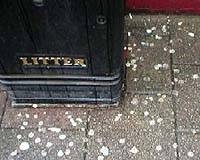
Government chews over Wiltshire suggestion
The Government will consider a proposal put forward by a Wiltshire Council employee to increase the tax on chewing gum to help cover the cost of clearing it up.
Bruce Purvis who works as a local studies librarian in Salisbury made the suggestion in response to Wiltshire Council publicity promoting the Sustainable Communities Act. This is a new law, introduced in 2007, which provides a way for local people to ask central government to take action on things they believe will improve their area.
The proposal was one of 20 ideas submitted from Wiltshire into a national selection process. The chewing gum proposal has been shortlisted by the Local Government Association and will now be put forward to the Government for consideration, and possible implementation.
Chewing gum litter is a widespread problem which is expensive and difficult to clear up. This proposal would see a 15p levy put on each pack of chewing gum to help councils cover the estimated £150 million national cost of clearing it up. The extra income could help to pay for additional street cleaners and jet washers to hose chewing gum off the pavement.
The proposal also encouraged Government to insist that manufacturers used biodegradable ingredients.
Bruce Purvis, who came up with the idea, said: "When I saw the publicity asking for suggestions for new ideas to improve the environment it seemed obvious to me that targeting chewing gum would be a perfect project.
"I felt sure that by putting the cost up on chewing gum and using the extra income to help councils clear it up could potentially save millions of pounds every year as well as get rid of an awful problem on our streets. I think it makes perfect sense."
Councillor Christopher Williams, portfolio holder for communities at Wiltshire Council, said: "Tackling the curse of chewing gum on our pavements would improve the look of streets across Wiltshire and across the country. It's time to take on the people who persist in littering our streets with disgusting blobs of sticky gum."
"Councils find it extremely difficult to catch the people who spit out their gum onto the street. Placing a levy on chewing gum would help pay for the expensive process of cleaning it up when it is dropped on the pavement."
"This idea has the potential to save councils millions of pounds every year."

Churchill Services Launch GumTarget
Churchill Contract Services, the facilities management company responsible for Willow Brook Shopping Centre, Bristol has joined the GumTarget Initiative.
Shopping centres, with their high pedestrian traffic, often suffer from ‘gum-drop hot-spots’ - places where large amounts of discarded gum adhere to flooring. Churchill Contract Services wants to do more than simply removing the littered chewing gum and has chosen GumTargets as an effective way to reduce the amount of gum littered by encouraging responsible disposal.
Chewing gum campaign's message sticks
THE AMOUNT of chewing gum dropped in ten city centre grotspots has fallen thanks to a campaign.
Peterborough City Council was involved in the Keep Britain Tidy's Save Yourself A Packet campaign in October which involved targeting ten gum "hotspots" with regular cleaning and monitoring as well as promoting awareness in schools.
Return visits by officers to those areas including parts of Bridge Street and Bourges Boulevard in December has found a 16 per cent decrease in the amount of chewing gum dropped there compared to before the campaign's start.
Council deputy leader councillor Matthew Lee said: "It is important to maintain the momentum and rid our streets of gum forever."
Initial Expands GumTarget Trial at Aviva
Following trial launches at York and Norwich, Initial has further expanded the GumTarget Initiative into the Aviva site at Glasgow. The hygiene, cleaning and facilities management company has recently begun using the GumTarget Initiative as an effective means to combat littered chewing gum at their client's sites; the first GumTarget site was launched in September 09 at the Aviva building in Norwich. Early results have been encouraging, and following this early success the scheme is now being expanded to include the Aviva Building, Glasgow.
MPs call for 'clean up tax' on chewing gum
MPs call for 'clean up tax' on chewing gum
People who buy chewing gum, cigarettes or fast food should be made to pay a "clean up tax" to tackle Britain's growing litter problem, according to an influential committee of MPs.
Sweet wrappers, hamburger boxes and chewing gum are the most common items dropped on the streets, at a huge cost to local councils.
The Environment, Food and Rural Affairs (EFRA) Committee want a new charge to be levied on products that produce the most litter.
The new levy is part of a long-awaited report on how Britain can turn around its "throwaway culture".
The committee recommend every council should be made to collect food waste separately, meaning a slop bucket in most homes, to reduce the amount of biodegradable waste going to landfill.
It also suggests that the "Primark effect" that is causing tonnes of cheap clothes to be dumped in landfill could be tackled by forcing manufacturers to meet a certain standard so that clothes can be recycled easily.
The MPs said the UK should boost its domestic recycling rate from 37 per cent to 50 per cent by 2015.
But "bin taxes", where people are fined for putting out more non-recycling waste, are only acceptable if the council provides a full run down of waste disposal costs and explains to householders why they are being charged extra.
The report comes as Boris Johnson, the Mayor of London, published plans to divert all of London's waste away from landfill by 2025 by producing more energy from waste and improving recycling facilities.
Michael Jack, the Chairman of the EFRA Committee, said people must become more responsible for what they throw away.
For example those who spit out chewing gum on the street should be made to pay extra for the cost of scraping it up.
He said the new "clean up levy" would be included in the cost of items paid by consumers at the point of purchase, like the current tax added to electrical items or cars to pay for environmental impact, and would only come to a fraction of the total cost.
"What we are advising is that if you are going to make a mess then you should make a contribution to clearing it up afterwards," he said.
The EFRA report also called on councils to start issuing more on-the-spot fines of £80 for people caught dropping litter and to help private landowners cope with fly-tipping.
Dickie Felton from Keep Britain Tidy welcomed the crackdown on litter but said the streets should be kept clean through a voluntary approach.
“Fast food and confectionery litter not only looks appalling it costs the taxpayer millions of pounds each year to clean-up," he said.
“We believe that companies should be taking more responsibility over what happens to that burger box or pasty wrapper once it leaves their premises.
“But we are not convinced that a “clean-up” levy is the right way to achieve cleaner streets.
“We very much believe in prevention rather than cure. We want all companies involved in the selling of cigarettes, drinks and confectionery to be doing more to encourage their customers to do the right thing and use a bin.”
Waveney District Council Launch GumTarget
Waveney Norse, the joint venture operation partners of Waveney District Council has introduced GumTargets to pedestrian areas across the district to counter the issue of chewing gum litter. The sites for the new GumTargets were selected following a survey of the issue.
Mike Daniels, Waveney Norse’s Cleansing Service Manager added: “We have worked with Meteora Ltd to understand the reasons why people drop used chewing gum and to identify the worst affected areas. We are confident that the GumTarget Initiative will make a significant reduction to our littered chewing gum.”
Peterborough Blighted By Gum Litter
HUNDREDS of sticky pieces of discarded chewing gum are blighting multi-million pound works to transform the heart of Peterborough city centre into a vibrant piazza.
A snap count by Evening Telegraph reporters found more than 400 pieces of chewed gum trodden into the newly laid clean and bright pavements around Cathedral Square, just months after they were laid.
And that figure included 186 spotted while skimming the pavements in a short walk from Barclays to HMV, 167 white and black blobs along the new paving blocks from Donald and Aitchison to McDonald's and at least 50 on the square in front of the Guild Hall.
Now a city councillor is calling on residents to take a pride in their city and do all they can to keep it clean and tidy.
The new paving blocks recently laid across Cathedral Square are part of a £6 million makeover.
Since April last year, the city centre has been crowded with hoardings with shoppers and traders finding it hard to navigate fencing and dodge the flow of construction vehicles.
What do you think about the gum menace? How can it be stopped?
Comment below, email us: news@ peterboroughtoday.co.uk or write us a letter now.
But now with the end of the work to create a modern city with sparkling fountains, new street furniture, colourful lighting and bright open spaces in sight, city centre councillor Nazim Khan is calling on the people of Peterborough to take pride in their city.
He said: "We have spent millions of pounds on upgrading the centre of Peterborough, but what is the point if we are just going to leave it to deteriorate?
"The people of Peterborough should be looking after the city for themselves. After all it is their home and they should take pride in it.
"We have to ask ourselves what sort of impression our dirty pavements are giving visitors to the city.
"How are we going to attract new people and businesses to Peterborough when we don't even look after it ourselves.
"The council should also be cracking down on those who throw their chewing gum on the floor.
"A campaign needs to be drawn up to raise awareness of the issue and street wardens need to be tougher and start fining those flouting the littering laws.
"Once finished, the Cathedral Square will provide a much-needed tranquil open space for people to escape the hustle and bustle and relax. People should act now and keep our city clean."
The council's head of strategic property, Andrew Edwards, who is overseeing the regeneration works, said the stone on the square is coated with a special sealant which makes the removal of gum easier.
He said: "We are aware of the chewing gum deposits on Cathedral Square, and it seems particularly bad around the entrance to Queensgate."Chewing gum is the curse of modern cities and it is a shame that people have to drop it.
"We intend to give the site a full and thorough clean once work has finished on the square, however our City Services staff regularly clean through the pedestrian area of the city."
San Fran to pass on gum clean up costs?
SAN FRANCISCO — Just four months after imposing a fee on cigarettes to offset cleanup costs, The City is considering adding a fee to the purchase price of chewing gum and other items that end up on streets and sidewalks.
As The City faced a massive deficit last year, Mayor Gavin Newsom proposed the first of these fee types, which was approved by the Board of Supervisors. The 20-cent charge on every pack of cigarettes purchased went into effect this fiscal year to offset the Department of Public Works’ cost of picking up those butts cluttering public spaces. The fee generates about $3 million annually for the agency.
As The City once again has to close a deficit in excess of $500 million, Newsom has ordered departments to come up with 30 percent in cuts.
“We’re going to contemplate an expansion of litter fees,” Department of Public Works director Ed Reiskin told the Board of Supervisors on Wednesday. “There are other pieces of litter that the Department of Environment in its audits has identified as contributing to our litter problem in the streets, so there is a nexus there that we may be able to establish.”
This year’s Department of Public Works budget is $172 million, of which $17 million is from The City’s general fund. DPW is responsible for the upkeep of San Francisco’s streets and infrastructure. The department also cleans city streets, plants and maintains trees, and removes graffiti from public property.
Supervisor John Avalos, who chairs the board’s Budget and Finance Committee, said, “I have to see the details.” Avalos said that small businesses are concerned about the cigarette fee. “I supported it. It was part of the balance of the budget,” Avalos said.
Currently, the DPW is proposing a study to determine if a connection exists between certain types of litter and cleanup costs. “To the extent possible, we want to make sure that the burden of the cost of litter on our streets rests with the people generating it,” DPW spokeswoman Christine Falvey said.
Chewing gum is the worst culprit of litter when it comes to so-called “small litter,” at about 40 percent of the litter counted, according to The City’s recent litter audit. That is followed by small glass, small paper and cigarette butts.
Adding fees at the consumer’s expense is a worry for business advocates.
“Small business in San Francisco is hurting and in danger of becoming a species that will disappear,” said Jimmy Shamieh, vice president of the Arab American Grocers Association. He said the tobacco fee and other similar fees would prompt customers to purchase the items outside of The City, where they are less expensive.
“It’s scaring the customers away from San Francisco,” Shamieh said.
Dawn Trennert, of the Middle Polk Neighborhood Association, a group partnering with The City on a campaign to stop cigarette littering, said that additional fees are worth exploring. She said during the lean budget years adequate street cleaning is a “concern.”
Oh Lordy - Gum Litter Problem at Church
Discarded chewing gum seems to have left a Peterborough priest with a sour taste in his mouth.
All Souls Church is hoping visitors will start to wrap it and bin it rather than stick it to a pew when it comes to leftover gum.
Father David Jennings told BBC Radio Cambridgeshire: "Nothing surprises us anymore.
"Visitors to weddings or funerals are chewing away before they come in and the bench becomes the obvious target."
Is there anything more frustrating than finding some chewing gum on your shoe or discovering you've sat right on top of a blob of the sticky stuff?
In order to cut out these messy situations the church has put a gum-spotting squad into action.
Father Jennings said: "We have a little team each week that checks the benches to see where the chewing gum is.
"It's a real problem, I think there's a problem in Peterborough generally.
"We've taken to politely saying something in our newsletter and even before a wedding or funeral we say 'if you have chewing gum would you like to put it outside'."
All Souls, on Geneva Street, established itself as a Catholic church in 1896 and Father Jennings is keen to preserve its integrity.
He said: "All we want is care for the building. All Souls is a much loved building, it's open every day.
"People come in, say a prayer or light a candle and we want to keep it a nice welcoming building.
"You imagine sitting down and the first thing you see is chewing gum."

|
|

